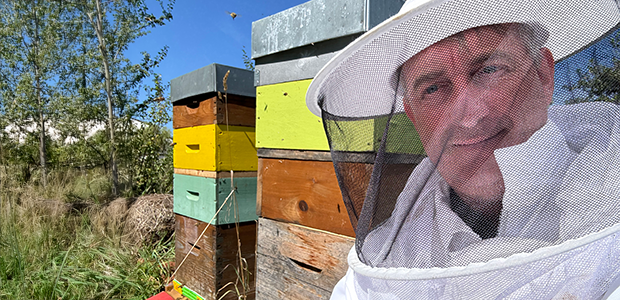
Don’t be as busy as a bee!
Bees are revered for their hard work and ‘busy as a bee’ is a common theme throughout culture and society worldwide. To create a single 500 gram jar of honey, honey bees will have collectively visited approximately 2,000,000 flowers. They will have flown 88,000 kilometres and visited up to 100 flowers in a single day. Bees live their lives at a fast pace, and in the summer that’s only about thirty-four days.
Then ... they go out like a bright light. They die. Of exhaustion.
At many workplaces today there is a culture of ‘busyness’ as a measure of success. We are always ON and always available. 24/7.
When we apply that "busy bee" metaphor to ourselves, we're missing something crucial. We've turned "busy" into a badge of honour. It's like we're saying, "Look how important I am! I'm so busy!" But what are we really accomplishing?
This pattern repeats itself. Ask someone how they are, and the answer is almost always, "Good, thanks. Busy." It's become a status symbol, a sign of value. We've bought into the idea that being constantly busy is how we achieve success, how we feel accomplished. But is it? Or is it just superficial?
When we equate our worth with the sheer quantity of work we do, we're walking a very thin line. It's a line between success and utter overwhelm. And when success hinges on doubling down and speeding up, well, that's a recipe for burnout, maybe even a mental health breakdown. We live in a culture that often values quantity over quality. We want things done quickly, and technology has certainly helped us with that. We can reply to emails faster, work faster, but are we working better?
The drive for speed often means we jump into problems without really thinking them through. We're seen as efficient, but are we effective? I'm not saying productivity is bad. I enjoy ticking things off my list as much as anyone. That dopamine hit is real! But the danger comes when we make it a habit to act before we think. We commit to more meetings, more projects, without considering the long-term consequences.
What happens then? We add more to our plates, so we work faster, get up earlier, see less of our families, and neglect our own well-being. We're exhausted. The initial enthusiasm we had is replaced by weariness and overwhelm. That ever-growing list of tasks? It's dispiriting. And without rest and relaxation, our physical and mental health suffers, and we make bad decisions.
So, what is the value of all this "busyness"? Are we really being productive, or are we just rushing to find the quickest, easiest solutions, not necessarily the right ones? As leaders, we need time for creative thinking and problem-solving, but that's hard to do when we're constantly on the go.
True productivity, I believe, involves being present and enjoying life's simple pleasures. Busyness strains our relationships and makes us miss opportunities for human connection. And often, that feeling of being busy is just an illusion, created by our busy minds and our emotional response to tasks. A missed deadline, an unread email – they trigger negative feelings and self-doubt. But it's just noise, contained within our own framework of values and judgments, and often amplified by a culture that rewards busyness.
What if we created a culture that allows us to pause and think? Could we make better-quality contributions? Would our work have a bigger impact? We need to ask ourselves, "Are we doing the right thing? What's the most effective way to solve this problem? What can we pause to meet that deadline?" When we slow down, we can solve problems better.
As humans, in an age of AI, our competitive advantage doesn't come from doing more but thinking harder. Pressing pause, stopping this quest for busyness, is how we gain a real competitive advantage. We need to replace "busyness" with meaningful contributions. I know it's hard, but sometimes we have to do the difficult things to create change. We need a mindset shift, from valuing busyness to prioritising self-care and team well-being. Our competitive advantage comes not from doing more, but from better thinking.
It's about engaging in bigger, more important problems. It requires individual confidence to stop and pause, and organisational permission to do so. A culture of better thinking involves vulnerability, open communication, and recognising quality over quantity. To quote Nancy Kline, the author of ‘Time to Think’; "The quality of everything we do depends on the quality of the thinking we do first."
So, let's not strive to be as busy as the bees. Let's prioritise thoughtful contributions and well-being. Let's value thinking and meaningful conversations over mere busyness. That's how we create better-quality work.
Stop. Pause. Breathe.
Don’t be as busy as a bee.

